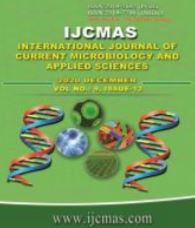


 National Academy of Agricultural Sciences (NAAS)
National Academy of Agricultural Sciences (NAAS)

|
PRINT ISSN : 2319-7692
Online ISSN : 2319-7706 Issues : 12 per year Publisher : Excellent Publishers Email : editorijcmas@gmail.com / submit@ijcmas.com Editor-in-chief: Dr.M.Prakash Index Copernicus ICV 2018: 95.39 NAAS RATING 2020: 5.38 |
Microalgae are emerging as a promising source of renewable biomass for the production of biofuels and valuable chemicals. However, energy efficient cultivation and harvesting technologies are necessary to improve for making it popular and economically viable. The identified strain Scendesmus sp is grown in FRP race way pond with capacity of 2500 l, developed for large scale cultivation of microalgae. Due to their small size and low concentration in the culture medium, cost-efficient harvesting of microalgae is a major challenge. In this study, various methods of harvesting were assessed viz. chemical flocculation, electrolysis, sedimentation and physical filtration methods are being evaluated. The efficiency of different harvesting processes were evaluated and economically assessed. The harvesting efficiency with ferric chloride showed harvesting efficiency 89.4 percent whereas with alum it was 88.2 percent. The use of alum for harvesting was found to be cost effective as compared to other chemical at large scale. Electro-chemical flocculation experiments were conducted in different volume size with constant voltage conditions and the minimum energy consumption was 1.18 kWh/kg. The capacity of harvesting volume has effects on energy consumption as the capacity increases the total energy consumption reduces. The lab scale study of harvesting of microalgae showed that auto flocculation using fine air bubbles followed by filtration showed more promising as compared to chemical flocculation method with a prolonged time as a constraint.
 |
 |
 |
 |
 |